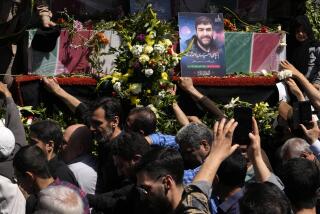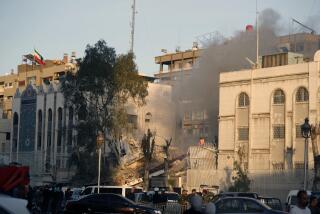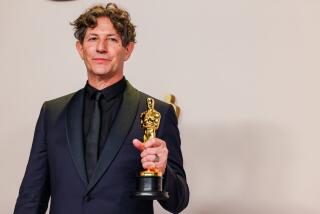Filmmaker Mohsen Makhmalbaf slammed in Iran for visit to Israel
BEIRUT -- Iran’s expatriate filmmaker Mohsen Makhmalbaf is facing withering condemnation in his homeland for attending a film festival in Israel, the Islamic Republi’s archfoe.
The acclaimed director, considered a pioneer of moviemaking in Iran, traveled to the Jerusalem Film Festival this month to screen his latest work, “The Gardener,” which explores the conflict between two generations about the role of religion in society.
Javad Shamgdari, the head of Iran’s official cinema organization, penned a letter to the leadership of the Iranian cinema museum demanding the removal of all of the director’s awards and trophies.
“Makhmalbaf made his first 10 films in Iran using the money of the state-run organizations to learn cinema,” Shamgdari was quoted as saying by the semiofficial Mehr news agency. “Now he has fallen into the arms of the occupier, the murderous Zionist regime.”
Members of Iran’s artistic community have expressed mixed feelings about Makhmalbaf’s visit to Israel.
Some 150 Iranian intellectuals, academics and artists signed a public letter assailing Makhmalbaf’s action. However, 80 others lauded him in an open letter sent to the Times of Israel.
The letter to the Israeli newspaper applauded the filmmaker’s “bravery for breaking the taboo of visiting the state of Israel and conveying the message of friendship between Iranian people and people of Israel.”
In intellectual circles in the Iranian capital, only those who criticized the filmmaker’s visit agreed to speak on the record.
Ali Mirzaei, a 38-year-old Tehran-based sculptor, argued that Makhmalbaf went to Jerusalem to drum up publicity for “The Gardener.”
“He is an opportunist who only tries to get into the limelight,” Mirzaei said.
In an interview with Britain’s Guardian newspaper, Makhmalbaf forcefully defended his decision to travel to Jerusalem.
“I went there to take a message of peace,” the filmmaker was quoted as saying. “I try to unite people through arts. I am citizen of cinema, and cinema has no border, and in fact before my journey to Israel my film traveled to that country many years before.”
Adding to the controversy, “The Gardener” -- which Makhmalbaf made in collaboration with his son, Maysam -- focuses on the Baha’i faith, a minority sect deemed hostile to the Islamic Republic. Several Baha’i holy places, including the Shrine of the Bab, are situated in what is today Israel.
A Persian-language website, Serat News, published a report saying Makhmalbaf had fallen victim to “the Zionist regime, the Bahaiis” and the Mujahedin Khalq, an opposition group that seeks the overthrow of the Islamic Republic.
Imprisoned for several years under the rule of the deposed shah, Makhmalbaf, 57, has made more than 20 feature films, won dozens of awards and sat on the juries of major film festivals. In 2001, Time magazine named Makhmalbaf’s award-winning film “Kandahar” one of the 100 best movies of all time.
Now based in Europe, Makhmalbaf left Iran after the election of outgoing President Mahmoud Ahmadinejad in 2005 . Four years later, the filmmaker threw his weight behind the presidential candidacy of opposition leader Mir-Hossein Mousavi, who was defeated by Ahmadinejad in the disputed 2009 election that saw protesters take to the streets alleging vote rigging. Iran’s opposition Green Movement was ultimately crushed.
In 2010, censors in Beirut pulled the plug on a film by Makhmalbaf’s then 22-year-old daughter, Hana. The film, “Green Days,’ about the post-election uprising, had been scheduled to coincide with a visit to Lebanon by Ahmadinejad.
ALSO:
Britain’s royal baby: Queen Elizabeth II pays a visit
Pope Francis visits shrine to ‘Our Lady Who Appeared’
Edward Snowden cleared to leave Moscow airport -- but not today
Special correspondents Sandels reported from Israel and Mostaghim from Tehran.
More to Read
Start your day right
Sign up for Essential California for news, features and recommendations from the L.A. Times and beyond in your inbox six days a week.
You may occasionally receive promotional content from the Los Angeles Times.






